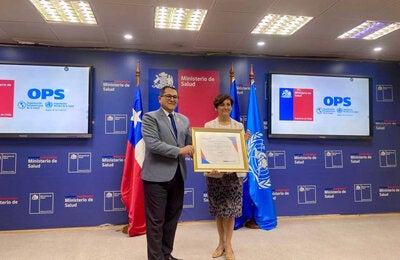Experts in mental health education from several Latin American countries gathered in Madrid, December 7-8 to explore ways of implementing mhGAP training in the context of mental health education. The meeting was hosted by the Department of Psychiatry of the Universidad Autónoma de Madrid (WHO Collaborating Center for Mental Health Services Research and Training), in collaboration with the Universidad Nacional Autónoma de México (UNAM), and PAHO/WHO.
"Mental health in the Region of the Americas is an essential issue for most of the countries, however, there is a need to further develop and expand mental health care services for the population," said Dr. Dévora Kestel, PAHO/WHO Mental Health and Substance Use Unit Chief, at the meeting held at UAM's Department of Psychiatry.
Experts in mental health education from Argentina, Brasil, Cuba, Chile, Guatemala, Mexico, Nicaragua, Panamá, Perú and the Dominican Republic shared the current status of mental health education in their countries and the need for better mental health care. Dr. Kestel highlighted that "one of the strategies followed by the World Health Organization is the integration of mental health in primary care". The mhGAP provides an opportunity for training non-specialized mental health workers in the management of mental disorders. The Institute of Psychiatry Ramón de la Fuente Muñiz and UNAM's Department of Psychiatry presented the mhGAP training delivered to 123 health care professionals in Mexico over the last three years.
Experts discussed strategies for improving mental health education for health professionals and to encourage the inclusion of mhGAP training in medical education as well as in clinical practice. As a result of this meeting, experts are currently working on a document with recommendations to improve mental health training at non-specialized care settings and to promote better mental health care delivery in coordination with primary care.



